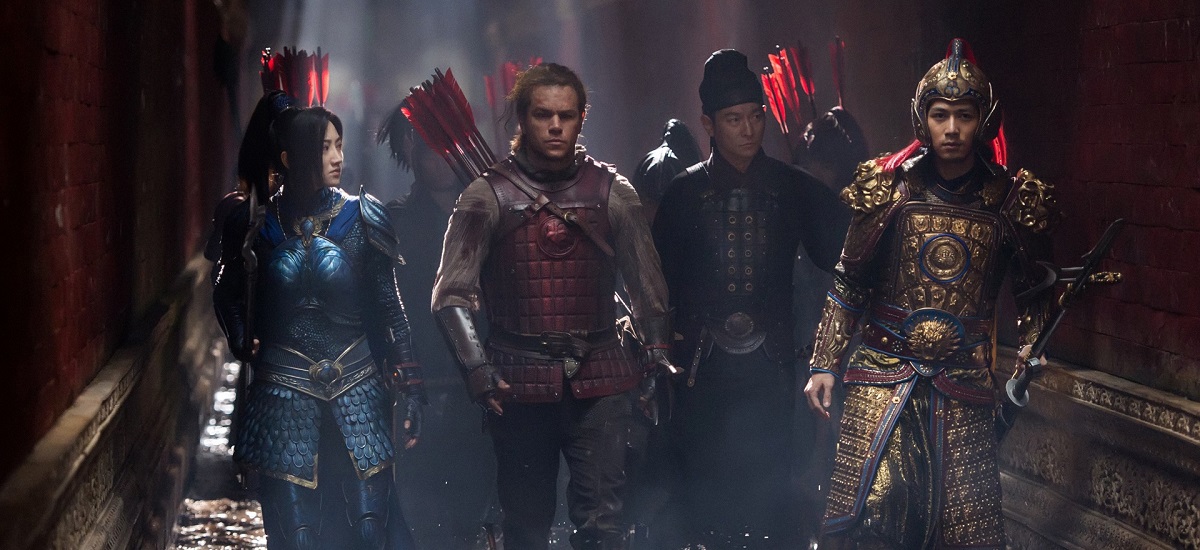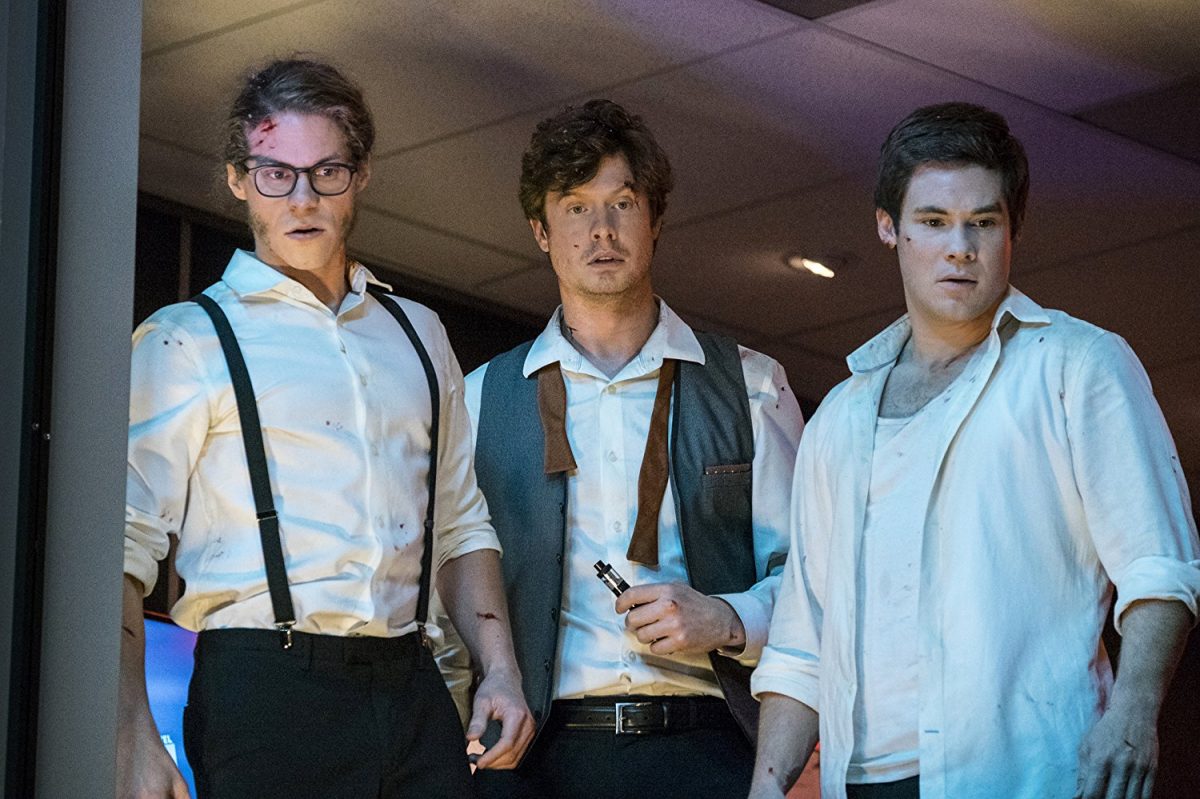The past several years has seen a push by Hollywood trying to make a dent in China’s box office. Numerous blockbuster films have taken a stab at the task either through official co-production, Chinese investors, Chinese talent, or a combination of each. Wrack your brain and you may remember Iron Man III, Star Trek Beyond, or more recently xXx: The Return Of Xander Cage. Now, both the US and China take on their biggest gambit, The Great Wall, a film staring one of America’s top respected actors, directed by one of China’s most critically acclaimed directors, with talent mixed behind the scenes.
In the hands of Zhang Yimou, The Great Wall, is almost a great film. Throughout it’s quick 104 minutes, there is thought and spectacle on display to rival most summer blockbusters. The action can often be ridiculous or preposterous, but gets presented with such aplomb, that it can’t help but be respected. It’s a sumptuous feast, with colors that pop and define characters purpose, simply and concisely.
An opening crawl sets the scene that this is one of many legends that has persisted over time, pertaining to the secret meaning behind The Great Wall of China. From there we are introduced to William (Matt Damon) and Tovar (Pedro Pascal), two mercenaries on a quest for “black powder”. They’ve been searching in vain for months, their companions cut down from 20 to a handful. After a midnight encounter dwindles the merry mercenaries down to a duet, our “heroes” flee to safety, with an arm from whatever attacked their group.
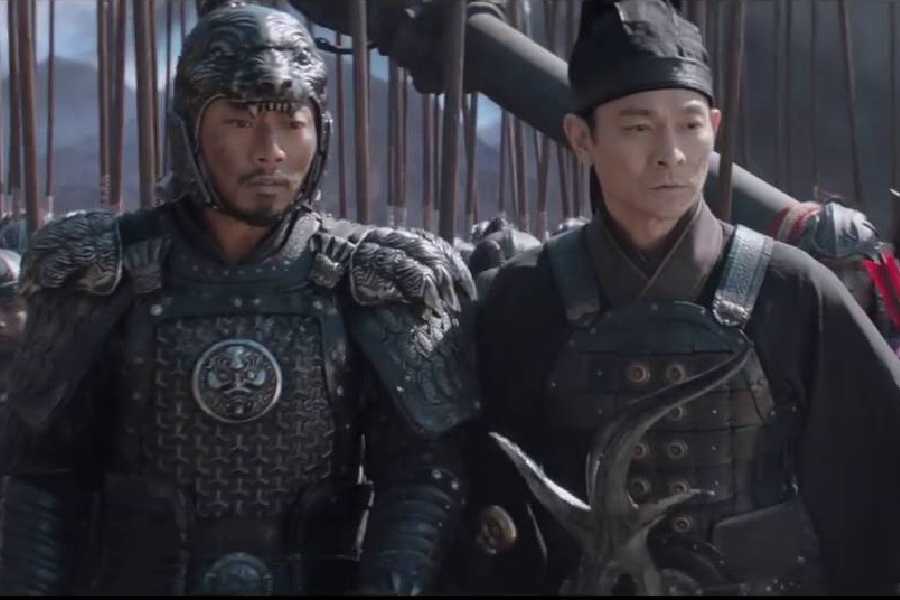 The moment they arrive at the great wall, the sense of scope and wonder thankfully get an injection. Yimou uses the same painterly eye here that won him great sucess with Raise The Red Lantern
The moment they arrive at the great wall, the sense of scope and wonder thankfully get an injection. Yimou uses the same painterly eye here that won him great sucess with Raise The Red Lantern
, Curse of the Golden Flower, and Hero. The camera soaks up every inch of the screen, relishing in each fine detail, whether it be the movement to power a primitive elevator, or a messenger making his long trek to a general’s war room among thousands of soldiers. In these instances, the movie makes the best decision possible, it breathes. This extends to the handling of the army of The Nameless Order too. Each armament gets color coded: Yellow is for guards and machine operators, red is for Arches, black is for foot soldiers, purple for Elites and blue for Women. The last may seem like a dig, but they are essentially a leaping lancer corp and not to be taken lightly.
It turns out the mysterious creature the mercenaries defeated belongs to one of the Tao Tie, a breed of creatures who attack the great wall every 60 years. The soldiers hold the belief that if the creatures were to make it past the wall, the world would be consumed and destroyed. Their legend tells that a meteorite was sent by the gods to crash into a mountain, releasing the Tao Tie, who wreak havoc on men due to their lust for power and greed.
As far as film monsters go, the Tao Tie rank high. It would be enough to give them an intricate design, but the The Great Wall has loftier aspirations. Early on, they let it be known that the monsters are hyper intelligent and work based on a hive mentality. Their queen is the prize and leader of all, always entrenched by the strongest and most evolved of her species. If that wasn’t enough to get someone excited, the Tao Tie are even seen to be protective and helpful to their wounded comrades, freeing anyone who gets trapped and taking their wounded back to base.
In a film that wants to emulate the traditional summer blockbuster, the action scenes provide a much needed wallop. Almost every conceivable weapon is unleashed upon the monsters and then some. The most ridiculous of which involves a contraption built into the great wall itself. As for particular set pieces, the film only has a small handful. Many aren’t necessarily needed, as what there is showcases plenty of variation, destruction and terrible deaths. If there would be a standout, it would be the battle in the fog. From the long rudimentary listening devices soldier use to hear encroaching enemies to whistling arrows, it knows that sometimes less is more, specially when it comes to the pay off.
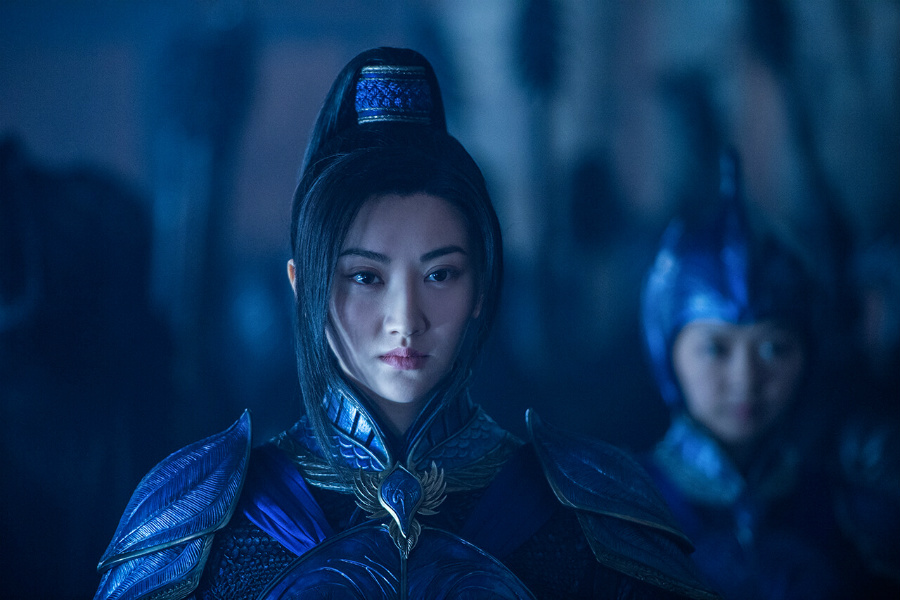 Since this is a Chinese dominated cast, you’d expect more than a few of them to stand out. Unfortunately it’s not as many as one could hope for. This is probably one of the biggest disservices to the film and honestly comes off as more than a little cheap. Those who do get to leave their mark, though, are given opportunity to do so. LuHan plays a junior footsoldier, whom Damon saves and takes a liking to early on. He isn’t given a ton of characterization, but survives long enough to feel developed. Commanding the screen, at least by exposure rate is Tian Jing as Commander Lin. She serves not just as Damon’s foil, but equal. The film gives her ample time to make an impression, it just doesn’t suit her with compelling material; instead, it revels in simply having her be a female high ranking officer. Again, though, it’s not just her, as any characterization comes from predictability instead of execution. Rounding out the Chinese side of things is Andy Lau as Strategist Wang. He only needs one sentence to define him, as he is Andy Lau. Regardless of how non-existent a character may be written, he will find a way to breathe life into the role.
Since this is a Chinese dominated cast, you’d expect more than a few of them to stand out. Unfortunately it’s not as many as one could hope for. This is probably one of the biggest disservices to the film and honestly comes off as more than a little cheap. Those who do get to leave their mark, though, are given opportunity to do so. LuHan plays a junior footsoldier, whom Damon saves and takes a liking to early on. He isn’t given a ton of characterization, but survives long enough to feel developed. Commanding the screen, at least by exposure rate is Tian Jing as Commander Lin. She serves not just as Damon’s foil, but equal. The film gives her ample time to make an impression, it just doesn’t suit her with compelling material; instead, it revels in simply having her be a female high ranking officer. Again, though, it’s not just her, as any characterization comes from predictability instead of execution. Rounding out the Chinese side of things is Andy Lau as Strategist Wang. He only needs one sentence to define him, as he is Andy Lau. Regardless of how non-existent a character may be written, he will find a way to breathe life into the role.
None of this is to say that the other actors get a better shake of the material. Pedro Pascal potentially jumps out of the trio, mostly due to the fact that he is playing “quippy international sidekick who can fight.” A thankless role, thought one he seems to enjoy. Dafoe is wasted as the initially intriguing Ballard, a former mercenary himself, who has remained at the wall for the past 25 years.
Then we come to Matt Damon. A passage of dialogue muddies William’s place origin by stating he fought for the English, then Danes, the Spanish and a few others before he ended up where he is now. It doesn’t entirely explain though why his accent seems to be Colonial Boston by way of Mumblesville. He’s never “bad” per se, over the course of the film, just vaguely disinterested. Since large portions of the film hinge on his willingness to act, this can be a hindrance.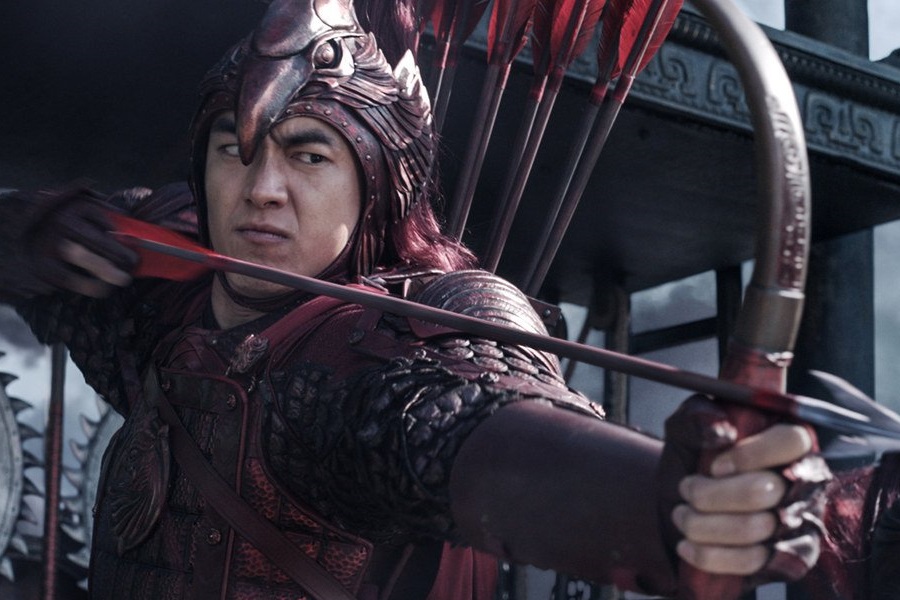 Ultimately, it ends up being the Americanization front that weighs The Great Wall down the most. The story credit features the 2 men responsible for attempting to bridge another international gap with 2003’s The Last Samurai. The writing side includes the team that wrote The Sorcerer’s Apprentice and Prince Of Persia: Sands Of Time. It seems a waste to see such pageantry undercut by tired cliches. An exchange between Pascal and Damon early on seems to have been supplied by the “we’re in a bad situation” dialogue generator. There are times that the film feels like it will go full on “white savior mode”, but it pulls back to show the strength or cunning of other characters as well. More often than not it falls into the age old trap of “the hero’s journey,” otherwise known as the hackiest technique a screenwriter can employ or follow. Not to say the idea or pursuit is bad, that’s a different discussion. The issue here, at least, is to suggest that it’s lazy workmanship.
Ultimately, it ends up being the Americanization front that weighs The Great Wall down the most. The story credit features the 2 men responsible for attempting to bridge another international gap with 2003’s The Last Samurai. The writing side includes the team that wrote The Sorcerer’s Apprentice and Prince Of Persia: Sands Of Time. It seems a waste to see such pageantry undercut by tired cliches. An exchange between Pascal and Damon early on seems to have been supplied by the “we’re in a bad situation” dialogue generator. There are times that the film feels like it will go full on “white savior mode”, but it pulls back to show the strength or cunning of other characters as well. More often than not it falls into the age old trap of “the hero’s journey,” otherwise known as the hackiest technique a screenwriter can employ or follow. Not to say the idea or pursuit is bad, that’s a different discussion. The issue here, at least, is to suggest that it’s lazy workmanship.
So many elements of the film seem to click. The design, the direction & costuming are top notch, as would be expecting from a film with which Yimou was involved. The creatures are some of the best realized to hit the screen in some time. There is thought and care and craft in every nook and cranny, but it’s empty, devoid of something grand or lasting. That’s to be expected from a film that’s meant to capitalize on global box office appeal. When you deal primarily with numbers, you dabble in greed and as the film so eloquently puts it, that’s when you set yourself up for ruin.

